#passover preparation
Text
I made the mistake of posting the first of the survey results right before Passover which was kind of bad timing lmao, we should be back to our regularly scheduled multigender data soon
#it's still passover but no more cleaning + no more seders to prepare for#so. more time for multigender things!
14 notes
·
View notes
Text
.
#partner and i are going into passover seder prepared for it to be SPICY pls wish us well#(student protests at columbia have led partner's family to espouse pro-isr**l opinions and partner has decided to Fight about it)#(i will be there to interject and calm everything down if/when given the signal)
6 notes
·
View notes
Text
i bought luigi’s mansion 👻
4 notes
·
View notes
Text
When Was Jesus Crucified and Resurrected
No Way! If Jesus was crucified on Friday, how was He in the grave three nights before being resurrected Sunday? The timing just doesn’t work out!
For just as Jonah was three days and three nights in the belly of the great fish, so will the Son of Man be three days and three nights in the heart of the earth.
Matthew 12:40
From Good Friday to Resurrection Sunday is not three nights in the…
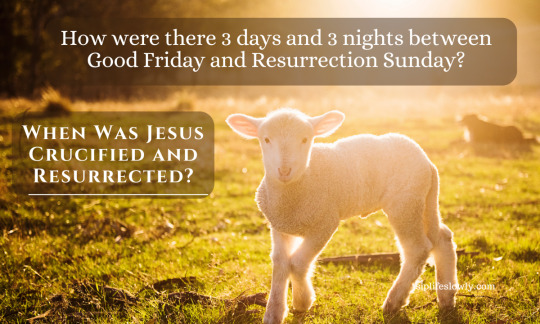
View On WordPress
#10th day of Nisan#acceptable#AD 30#agony#bearer#Biblical day#biblical feasts#build relationship with God#burden#burden bearer#burden is light#Celebrating Jesus in the Biblical Feasts#Crucifixion#darkness#date#dating#dating the crucifixion#dating the resurrection#Day of Preparation#death#depressed#dimension#Does God protect me#Dr. Richard Booker#emotional pain#escape#escaping#Feast of Firstfruits#Feast of Passover#feast of unleavened bread
1 note
·
View note
Text
The Third Day - Audio Message - March 10, 2024
https://akronalliance.sermon.net/main/main/22243566
Pastor Gus Brown
View On WordPress
#Annas#Caiaphas#darkness#daybreak#death#first day#Herod#Jewish#Jonah#Passover#Pilate#pray#preparation#sign#thieves#third#three
0 notes
Text
The fact that I’m most likely going to have to order Matzah online because neither the grocery stores (or adjacent) in my area or the area where I work carry anything kosher is the current bane of my existence.
1 note
·
View note
Text
22 April 2024 - 14 Nisan 5784
Today is Erev Pesach, Passover begins at sunset!
Passover, or “Pesach” in Hebrew, is the holiday which celebrates the Exodus of the Jewish people from slavery in Egypt.
Preparations for the holiday will often continue throughout the day, as the first Seder is tonight. A Seder is an orchestrated festive meal, which includes lots of food, singing, the story of the Passover, and other rituals.
During Passover there is a different set of dietary restrictions, which forbids Chametz, leavened bread products. On Erev Pesach, there is customs to burn all such products in your home, and recite a special blessing to “nullify” them.
Some observe T'anit Bechorot, The Fast of the First Born, from daybreak to sunset today.
357 notes
·
View notes
Text
80th Anniversary of the Warsaw Ghetto Uprising: "The World Has to Know That We Did Not Go Like Lambs to the Slaughter."
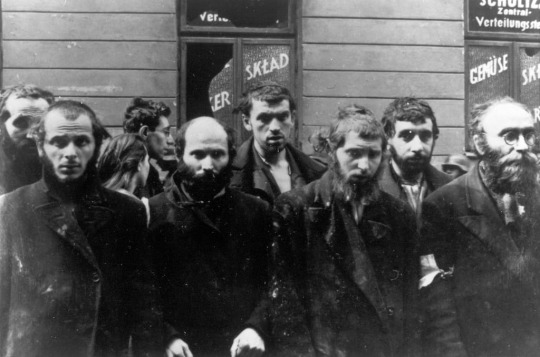
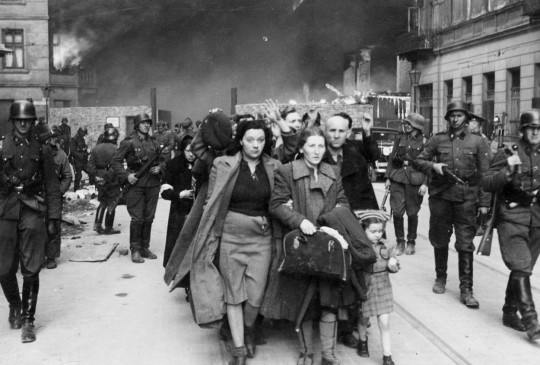

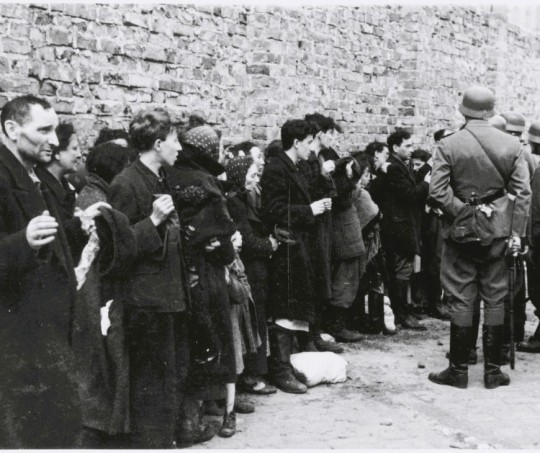
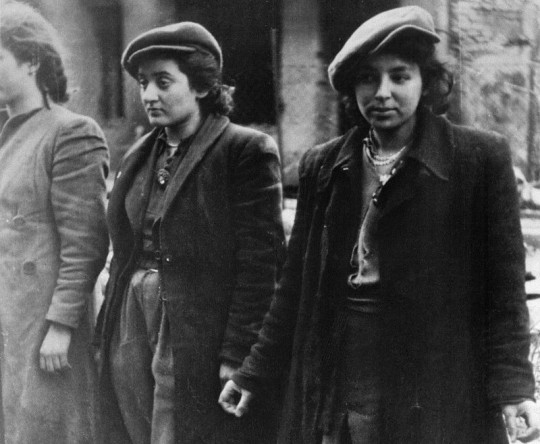
April 19th, 1943 - May 16th, 1943
Warsaw, Poland
“The question is not why all the Jews did not fight, but how so many of them did. Tormented, beaten, starved, where did they find the strength, spiritual and physical, to resist?” – Elie Wiesel
In the morning of April 19th, 1943, on what would be the first night of Passover, the Warsaw Ghetto Uprising began. German troops and SS entered the ghetto to deport its surviving inhabitants to the death camps.
In the summer of 1942, as Jews living in the Warsaw ghetto were deported to Treblinka, reports that made their way back quickly made it clear that "resettlement" meant mass-murder. In response to this, Jews citizens in the ghetto began forming organized resistance forces; the Jewish Combat Organization (ŻOB) and the Jewish Military Union (ŻZW).
Following the January 1943 success of a smaller-scale resistance preventing a deportation attempt, an act that led to the suspension of such deportation efforts by the Nazis, the residents began to secretly build subterranean tunnels and shelters in preparation for a full-scale uprising.
Throughout April rumours swirled of a final deportation of the ghetto's remaining Jews. On the 18th it became clear that German forces, reinforced with artillery and tanks, were moving in to carry out their final action. The alarm was raised, and residents retreated to their underground shelters. They would remain here for the duration of the uprising, refusing to surrender themselves to deportation.
A group of around 700 Jewish resistance fighters, made up of the ŻOB and ŻZW and led by 24-year-old Mordechai Anilevitch, joined together to stage what would be their final stand against the Nazis. These brave young people were malnourished and lacked proper military training, they were equipped with nothing but poor-quality or even homemade weapons and their bare hands.
By contrast German forces numbered 2000, they were well-equipped and well-trained and had advanced knowledge of the existence of these resistance groups.
Despite this stark imbalance, on the first day of the uprising the ragtag Jewish fighters met the invaders head on and successfully forced the Nazis to retreat outside the city walls.
Amongst all of the chaos and destruction all around them, the Jews hiding in the tunnels and bunkers gathered together to celebrate Passover with what little they had, breaking homecooked matzah and drinking illicitly obtained wine.
The Warsaw Ghetto Uprising held strong for a full 27 days, coming to an end on May 16th, 1943. Unable to gain a full advantage, the Germans had resorted to burning the Warsaw Ghetto to the ground in an attempt flush out those in hiding so they could be rounded up.
In the months following the official end of the uprising some Jews remained hiding out in the rubble, periodically attacking German police on patrol.
This was the largest uprising by Jews during World War II and the first significant urban revolt against German occupation in Europe. It inspired many more uprisings, especially amongst Jews in camps and Ghettos.
May Their Memories Be a Revolution
Learn More:
Warsaw Ghetto Uprising | Holocaust Encyclopedia
Holocaust Survivors Describe the Last Passover in the Warsaw Ghetto
Tuesday, Nissan 27, 5783 / April 18, 2023 - Jewish Calendar - On This Day
#jumblr#jewish#judaism#yom hashoah#holocaust remembrance day#the shoah#shoah#shoah remembrance day#holocaust#the holocaust#shoah mention#holocaust mention#antisemitism#antisemitism tw#tw antisemitism#jewish history#nazi tw#warsaw#warsaw ghetto#warsaw ghetto uprising#may their memories be a blessing#may their memories be a revolution#a few days early
2K notes
·
View notes
Text
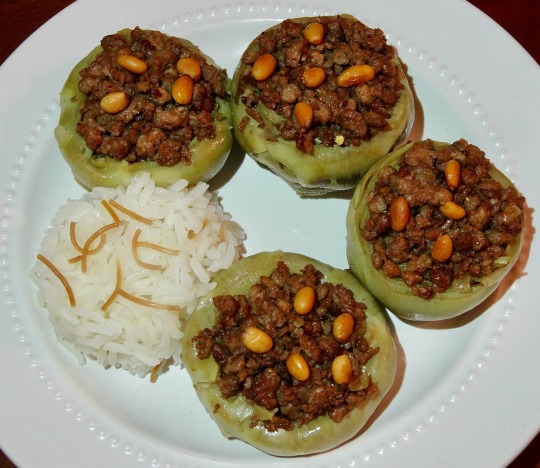
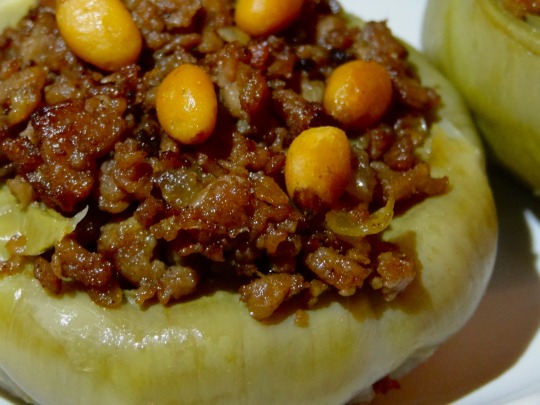
[ID: The first image is of four stuffed artichoke hearts on a plate with a mound of rice and fried vermicelli; the second is a close-up on one artichoke, showing fried ground 'beef' and golden pine nuts. End ID]
أرضي شوكي باللحم / Ardiyy-shawkiyy b-al-lahm (Stuffed artichoke hearts)
Artichoke hearts stuffed with spiced meat make a common dish throughout West Asia and North Africa, with variations on the recipe eaten in Lebanon, Syria, Palestine, Algeria, and Morocco. In Palestine, the dish is usually served on special occasions, either as an appetizer, or as a main course alongside rice. The artichokes are sometimes paired with cored potatoes, which are stuffed and cooked in the same manner. Stuffed artichokes do not appear in Medieval Arab cookbooks (though artichokes do), but the dish's distribution indicates that its origin may be Ottoman-era, as many other maḥshis (stuffed dishes) are.
The creation of this dish is easy enough once the artichoke hearts have been excavated (or, as the case may be, purchased frozen and thawed): they are briefly deep-fried, stuffed with ground meat and perhaps pine nuts, then stewed in water, or water and tomato purée, or stock, until incredibly tender.
While simple, the dish is flavorful and well-rounded. A squeeze of lemon complements the bright, subtle earthiness of the artichoke and cuts through the richness of the meat; the fried pine nuts provide a play of textures, and pick up on the slight nutty taste that artichokes are known for.
Terminology and etymology
Artichokes prepared in this way may be called "ardiyy-shawkiyy b-al-lahm." "Ardiyy-shawkiyy" of course means "artichoke"; "ب" ("b") means "with"; "ال" ("al") is the determiner "the"; and "لَحْم" ("laḥm") is "meat" (via a process of semantic narrowing from Proto-Semitic *laḥm, "food"). Other Palestinian Arabic names for the same dish include "أرضي شوكي محشي" ("ardiyy-shawkiyy maḥshi," "stuffed artichokes"), and "أرضي شوكي على ادامه" ("ardiyy-shawkiyy 'ala adama," "artichokes cooked in their own juice").
The etymology of the Levantine dialectical phrase meaning "artichoke" is interestingly circular. The English "artichoke" is itself ultimately from Arabic "الخُرْشُوف" ("al-khurshūf"); it was borrowed into Spanish (as "alcarchofa") during the Islamic conquest of the Iberian peninsula, and thence into English via the northern Italian "articiocco." The English form was probably influenced by the word "choke" via a process of phono-semantic matching—a type of borrowing wherein native words are found that sound similar to the foreign word ("phonetics"), and communicate qualities associated with the object ("semantics").
"Artichoke" then returned to Levantine Arabic, undergoing another process of phono-semantic matching to become "ardiyy-shawkiyy": أَرْضِيّ ("ʔarḍiyy") "earthly," from أَرْض ("ʔarḍ"), "Earth, land"; and شَوْكِيّ ("shawkiyy") "prickly," from شَوْك ("shawk"), "thorn."
Artichokes in Palestine
Artichoke is considered to be very healthful by Palestinian cooks, and it is recommended to also consume the water it is boiled in (which becomes delightfully savory and earthy, suitable as a broth for soup). In addition to being stuffed, the hearts may be chopped and cooked with meat or potatoes into a rich soup. These soups are enjoyed especially during Ramadan, when hot soup is popular regardless of the season—but the best season for artichokes in the Levant is definitively spring. Stuffed artichokes are thus often served by Jewish people in North Africa and West Asia during Passover.
Artichokes grow wild in Palestine, sometimes in fields adjacent to cultivated crops such as cereals and olives. Swiss traveler Johann Ludwig Burckhardt, writing in 1822, referred to the abundant wild artichoke plants (presumably Cynara syriaca) near لُوبْيا ("lūbyā"), a large village of stone buildings on a hilly landscape just west of طبريا ("ṭabariyya," Tiberias):
About half an hour to the N. E. [of Kefer Sebt (كفر سبط)] is the spring Ain Dhamy (عين ظامي), in a deep valley, from hence a wide plain extends to the foot of Djebel Tor; in crossing it, we saw on our right, about three quarters of an hour from the road, the village Louby (لوبي), and a little further on, the village Shedjare (شجره). The plain was covered with the wild artichoke, called khob (خُب); it bears a thorny violet coloured flower, in the shape of an artichoke, upon a stem five feet in height.
(Despite resistance from local militia and the Arab Liberation Army, Zionist military groups ethnically cleansed Lubya of its nearly 3,000 Palestinian Arab inhabitants in July of 1948, before reducing its buildings and wells to rubble, The Jewish National Fund later planted the Lavi pine forest over the ruins.)
Artichokes are also cultivated and marketed. Elihu Grant, nearly a century after Burckhardt's writing, noted that Palestinian villages with sufficient irrigation "[went] into gardening extensively," and marketed their goods in crop-poor villages or in city markets:
Squash, pumpkin, cabbage, cauliflower, lettuce, turnip, beet, parsnip, bean, pea, chick-pea, onion, garlic, leek, radish, mallow and eggplant are common varieties [of vegetable]. The buds of the artichoke when boiled make a delicious dish. Potatoes are getting to be quite common now. Most of them are still imported, but probably more and more success will be met in raising a native crop.
Either wild artichokes (C. syriaca) or cardoons (C. cardunculus, later domesticated to yield modern commerical artichokes) were being harvested and eaten by Jewish Palestinians in the 1st to the 3rd centuries AD (the Meshnaic Hebrew is "עַכָּבִיּוֹת", sg. "עַכָּבִית", "'aqubit"; related to the Arabic "عَكُوب" "'akūb," which refers to a different plant). The Tosefta Shebiit discusses how farmers should treat the sprouting of artichokes ("קינרסי," "qinrasi") during the shmita year (when fields are allowed to lie fallow), indicating that Jews were also cultivating artichokes at this time.
Though artichokes were persistently associated with wealth and the feast table (perhaps, Susan Weingarten speculates, because of the time they took to prepare), trimming cardoons and artichokes during festivals, when other work was prohibited, was within the reach of common Jewish people. Those in the "upper echelons of Palestinian Jewish society," on the other hand, had access to artichokes year-round, including (through expensive marvels of preservation and transport) when they were out of season.
Jewish life and cuisine
Claudia Roden writes that stuffed artichoke, which she refers to as "Kharshouf Mahshi" (خرشوف محشي), is "famous as one of the grand old Jerusalem dishes" among Palestinian Jews. According to her, the stuffed artichokes used to be dipped in egg and then bread crumbs and deep-fried. This breading and frying is still referenced, though eschewed, in modern Sephardi recipes.
Prior to the beginning of the first Aliyah (עלייה, wave of immigration) in 1881, an estimated 3% of the overall population of Palestine, or 15,011 people, were Jewish. This Jewish presence was not the result of political Zionist settler-colonialism of the kind facilitated by Britain and Zionist organizations; rather, it consisted of ancestrally Palestinian Jewish groups, and of refugees and religious immigrants who had been naturalized over the preceding decades or centuries.
One such Jewish community were the Arabic-speaking Jews whom the Sephardim later came to call "מוּסְתערבים" or "مستعربين" ("Musta'ravim" or "Musta'ribīn"; from the Arabic "مُسْتَعْرِب" "musta'rib," "Arabized"), because they seemed indifferentiable from their Muslim neighbors. A small number of them were descendants of Jews from Galilee, which had had a significant Jewish population in the mid-1st century BC; others were "מגרבים" ("Maghrebim"), or "مغربية" ("Mughariba"): descendents of Jews from Northwest Africa.
Another major Jewish community in pre-mandate Palestine were Ladino-speaking descendents of Sephardi Jews, who had migrated to Palestine in the decades following their expulsion from Spain and then Portugal in the late 15th century. Though initially seen as foreign by the 'indigenous' Mista'avim, this community became dominant in terms of population and political influence, coming to define themselves as Ottoman subjects and as the representatives of Jews in Palestine.
A third, Yiddish- and German-speaking, Askenazi Jewish population also existed in Palestine, the result of immigration over the preceding centuries (including a large wave in 1700).
These various groups of Jewish Palestinians lived as neighbors in urban centers, differentiating themselves from each other partly by the language they spoke and partly by their dress (though Sephardim and Ashkenazim quickly learned Arabic, and many Askenazim and Muslims learned Ladino). Ashkenazi women also learned from Sephardim how to prepare their dishes. These groups' interfamiliarity with each other's cuisine is further evidenced by the fact that Arabic words for Palestinian dishes entered Ladino and Yiddish (e.g. "كُفْتَة" / "kufta," rissole; "مَزَّة" "mazza," appetizer); and words entered Arabic from Ladino (e.g. "דונסי" "donsi," sweet jams and fruit leather; "בוריק" "burek," meat and cheese pastries; "המים" "hamim," from "haminados," braised eggs) and Yiddish (e.g. "לעקעך" "lakach," honey cake).
In addition to these 'native' Jews were another two waves of Ashkenazi migration in the late 18th and early-to-mid 19th centuries (sometimes called the "היישוב הישן," "ha-yishuv ha-yashan," "old settlement," though the term is often used more broadly); and throughout the previous centuries there had also been a steady trickle of religious immigration, including elderly immigrants who wished to die in Jerusalem in order to be present at the appointed place on the day of Resurrection. Recent elderly women immigrants unable to receive help from charitable institutions would rely on the community for support, in exchange helping the young married women of the neighborhood with childcare and with the shaping of pastries ("מיני מאפה").
In the first few centuries AD, the Jewish population of Palestine were largely farmers and agricultural workers in rural areas. By the 16th century, however, most of the Jewish population resided in the Jewish Holy Cities of Jerusalem (القُدس / al-quds), Hebron (الخليل / al-khalil), Safed (صفد), and Tiberias (طبريا / ṭabariyya). In the 19th century, the Jewish population lived entirely in these four cities and in expanding urban centers Jaffa and Haifa, alongside Muslims and Christians. Jerusalem in particular was majority Jewish by 1880.
In the 19th century, Jewish women in Jerusalem, like their Christian and Muslim neighbors, used communal ovens to bake the bread, cakes, matzah, cholent, and challah which they prepared at home. One woman recalls that bread would be sent to the baker on Mondays and Thursdays—but bribes could be offered in exchange for fresh bread on Shabbat. Charges would be by the item, or else a fixed monthly payment.
Trips to the ovens became social events, as women of various ages—while watching the bakers, who might not put a dish in or take it out in time—sent up a "clatter" of talking. During religious feast days, with women busy in the kitchen, some families might send young boys in their stead.
Markets and bakeries in Jerusalem sold bread of different 'grades' based on the proportion of white and wheat flour they contained; as well as flatbread (خبز مفرود / חובז מפרוד / khobbiz mafroud), Moroccan מאווי' / ماوي / meloui, and semolina breads (כומאש / كماج / kmaj) which Maghrebim especially purchased for the Sabbath.
On the Sabbath, those who had brick ovens in their sculleries would keep food, and water for tea and coffee, warm from the day before (since religious law prohibits performing work, including lighting fires, on Shabbat); those who did not would bring their food to the oven of a neighbor who did.
Palestinian Jewish men worked in a variety of professions: they were goldsmiths, writers, doctors, merchants, scientists, linguists, carpenters, and religious scholars. Jewish women, ignoring prohibitions, engaged in business, bringing baked goods and extra dairy to markets in Jerusalem, grinding and selling flour, spinning yarn, and making clothing (usually from materials purchased from Muslims); they were also shopkeepers and sellers of souvenirs and wine. Muslims, Jews, and Christians shared residential courtyards, pastimes, commercial enterprises, and even holidays and other religious practices.
Zionism and Jewish Palestinians
Eastern European Zionists in the 1880s and 90s were ambivalent towards existing Jewish communities in Palestine, often viewing them as overly traditional and religious, backwards-thinking, and lacking initiative. Jewish Palestinians did not seem to conform with the land-based, agricultural, and productivist ideals of political Zionist thinkers; they were integrated into the Palestinian economy (rather than seeking to create their own, segregated one); they were not working to create a Jewish ethnostate in Palestine, and seemed largely uninterested in nationalist concerns. Thus they were identified with Diaspora Jewish culture, which was seen as a remnant of exile and oppression to be eschewed, reformed, or overthrown.
These attitudes were applied especially to Sephardim and Mista'arevim, who were frequently denigrated in early Zionist literature. In 1926, Revisionist Zionist leader Vladimir Jabotinsky wrote that the "Jews, thank God, have nothing in common with the East. We must put an end to any trace of the Oriental spirit in the Jews of Palestine." The governance of Jewish communities was, indeed, changed with the advent of the British Mandate (colonial rule which allowed the British to facilitate political Zionist settling), as European political and "socialist" Zionists promoted Ashkenazi over Sephardi leadership.
Under the Ottomans, the millet system had allowed a degree of Jewish and Christian autonomy in matters of religious study and leadership, cultural and legal affairs, and the minting of currency. The religious authority of all Jewish people in Palestine had been the Sephardi Rabbi of Jerusalem, and his authority on matters of Jewish law (like the authority of the Armenian Patriarchate on matters of Christian law) extended outside of Palestine.
But British and European funding allowed newer waves of Ashkenazi settlers (sometimes called "היישוב החדש," "ha-yishuv ha-khadash," "new settlement")—who, at least if they were to live out the ideals of their sponsors, were more secular and nationalist-minded than the prior waves of Ashkenazi immigration—to be de facto independent of Sephardi governance. Several factors lead to the drying up of halaka (donated funds intended to be used for communal works and the support of the poor in Sephardi communities), which harmed Sephardim economically.
Zionist ideas continued to dominate newly formed committees and programs, and Palestinian and Sephardi Jews reported experiences of racial discrimination, including job discrimination, leading to widespread poverty. The "Hebrew labor" movement, which promoted a boycott of Palestinian labor and produce, in fact marginalized all workers racialized as Arab, and promises of work in Jewish labor unions were divided in favor of Ashkenazim to the detriment of Sephardim and Mizrahim. This economic marginalization coincided with the "social elimination of shared indigenous [Palestinian] life" in the Zionist approach to indigenous Jews and Muslims.
Despite the adversarial, disdainful, and sometimes abusive relationship which the European Zionist movement had with "Oriental" Jews, their presence is frequently used in Zionist food and travel writing to present Israel as a multicultural and pluralist state. Dishes such as stuffed artichokes are claimed as "Israeli"—though they were eaten by Jews in Palestine prior to the existence of the modern state of Israel, and though Sephardi and Mizrahi diets were once the target of a civilizing, correcting mission by Zionist nutritionists. The deep-frying that stuffed artichokes call for brings to mind European Zionists' half-fascinated, half-disgusted attitudes towards falafel.
The point is not to claim a dish for any one national or ethnic group—which is, more often than not, an exercise in futility and even absurdity—but to pay attention to how the rhetoric of food writing can obscure political realities and promote the colonizer's version of history. The sinking of Jewish Palestinian life prior to the advent of modern political Zionism, and the corresponding insistence that it was Israel that brought "Jewish cuisine" to Palestine, allow for such false dichotomies as "Jewish-Palestinian relations" or "Jewish-Arab relations"; these descriptors further Zionist rhetoric by making a clear situation of ethnic cleansing and settler-colonialism sound like a complex and delicate issue of inter-ethnic conflict. To boot, the presentation of these communities as having merely paved the way to Zionist nationalism ignores their existence as groups with their own political, social, and cultural lives and histories.
Help evacuate a Gazan family with Operation Olive Branch
Buy an eSim for use in Gaza
Help Anera provide food in Gaza
Ingredients:
Serves 4 (as a main dish).
For the artichokes:
6 fresh, very large artichokes; or frozen (not canned) whole artichoke hearts
1 lemon, quartered (if using fresh artichokes)
250g (1 1/2 cups) vegetarian ground beef substitute; or 3/4 cup TVP hydrated with 3/4 cup vegetarian 'beef' stock from concentrate
1 yellow onion, minced
Scant 1/2 tsp kosher salt
1/2 tsp ground black pepper
1 pinch ground cardamom (optional)
1/4 tsp ground allspice or seb'a baharat (optional)
1 Tbsp pine nuts (optional)
Water, to simmer
Oil, to fry
2 tsp vegetarian 'beef' stock concentrate, to simmer (optional)
Lemon, to serve
Larger artichokes are best, to yield hearts 3-4 inches in width once all leaves are removed. If you only have access to smaller artichokes, you may need to use 10-12 to use up all the filling; you might also consider leaving some of the edible internal leaves on.
The meat may be spiced to taste. Sometimes only salt and black pepper are used; some Palestinian cooks prefer to include seb'a baharat, white pepper, allspice, nutmeg, cardamom, and/or cinnamon.
Medieval Arab cookbooks sometimes call for vegetables to be deep-fried in olive oil (see Fiḍālat al-Khiwān fī Ṭayyibāt al-Ṭaʿām wa-l-Alwān, chapter 6, recipe no. 373, which instructs the reader to treat artichoke hearts this way). You may use olive oil, or a neutral oil such as canola or sunflower (as is more commonly done in Palestine today).
Elihu Grant noted in 1921 that lemon juice was often served with stuffed vegetable dishes; today stuffed artichokes are sometimes served with lemon.
For the rice:
200g Egyptian rice (or substitute any medium-grained white rice)
2 tsp broken semolina vermicelli (شعيريه) (optional)
1 tsp olive oil (optional)
Large pinch salt
520g water, or as needed
Broken semolina vermicelli (not rice vermicelli!) can be found in plastic bags at halal grocery stores.
Instructions:
For the stuffed artichokes:
1. Prepare the artichoke hearts. Cut off about 2/3 of the top of the artichoke (I find that leaving at least some of the stem on for now makes it easier to hollow out the base of the artichoke heart without puncturing it).
2. Pull or cut away the tough outer bracts ("leaves") of the artichoke until you get to the tender inner leaves, which will appear light yellow all the way through. As you work, rub a lemon quarter over the sides of the artichoke to prevent browning.
3. If you see a sharp indentation an inch or so above the base of the artichoke, use kitchen shears or a sharp knife to trim off the leaves above it and form the desired bowl shape. Set aside trimmings for a soup or stew.
4. Use a small spoon to remove the purple leaves and fibers from the center of the artichoke. Make sure to scrape the spoon all along the bottom and sides of the artichoke and get all of the fibrous material out.
5. Use a paring knife to remove any remaining tough bases of removed bracts and smooth out the base of the artichoke heart. Cut off the entire stem, so that the heart can sit flat, like a bowl.
6. Place the prepared artichoke heart in a large bowl of water with some lemon juice squeezed into it. Repeat with each artichoke.
7. Drain artichoke hearts and pat dry. Heat a few inches of oil in a pot or wok on medium and fry artichoke hearts, turning over occasionally, for a couple minutes until lightly browned. If you don't want to deep-fry, you can pan-fry in 1 cm or so of oil, flipping once. Remove with a slotted spoon and drain.
8. Prepare the filling. Heat 1 tsp of olive oil in a large skillet on medium-high and fry onions, agitating often, until translucent.
Tip: Some people add the pine nuts and brown them at this point, to save a step later. If you do this, they will of course be mixed throughout the filling rather than being a garnish on top.
9. Add spices, salt, and meat substitute and fry, stirring occasionally, until meat is browned. (If using TVP, brown it by allowing it to sit in a single layer undisturbed for 3-4 minutes, then stir and repeat.) Taste and adjust spices and salt.
10. Heat 1 Tbsp of olive oil or margarine in a small pan on medium-low. Add pine nuts and fry, stirring constantly, until they are a light golden brown, then remove with a slotted spoon. Note that, once they start taking on color, they will brown very quickly and must be carefully watched. They will continue to darken after they are removed from the oil, so remove them when they are a shade lighter than desired.
11. Stuff the artichoke hearts. Fill the bowl of each heart with meat filling, pressing into the bottom and sides to fill completely. Top with fried pine nuts.
12. Cook the artichoke hearts. Place the stuffed artichoke hearts in a single layer at the bottom of a large stock pot, along with any extra filling (or save extra filling to stuff peppers, eggplant, zucchini, or grape leaves).
13. Whisk stock concentrate into several cups of just-boiled water, if using—if not, whisk in about a half teaspoon of salt. Pour hot salted water or stock into the pot to cover just the bottoms of the stuffed artichokes.
14. Simmer, covered, for 15-20 minutes, until the artichokes are tender. Simmer uncovered for another 5-10 minutes to thicken the sauce.
For the rice:
1. Rinse your rice once by placing it in a sieve, putting the sieve in a closely fitting bowl, then filling the bowl with water; rub the rice between your fingers to wash, and remove the sieve from the bowl to strain.
2. Place a bowl on a kitchen scale and tare. Add the rice, then add water until the total weight is 520g. (This will account for the amount of water stuck to the rice from rinsing.)
3. (Optional.) In a small pot with a close-fitting lid, heat 1 tsp olive oil. Add broken vermicelli and fry, agitating often, until golden brown.
4. Add the rice and water to the pot and stir. Increase heat to high and allow water to come to a boil. Cover the pot and lower heat to a simmer. Cook the rice for 15 minutes. Remove from heat and steam for 10 minutes.
To serve:
1. Plate artichoke hearts on a serving plate alongside rice and lemon wedges; or, place artichoke hearts in a shallow serving dish, pour some of their cooking water in the base of the dish, and serve rice on a separate plate.
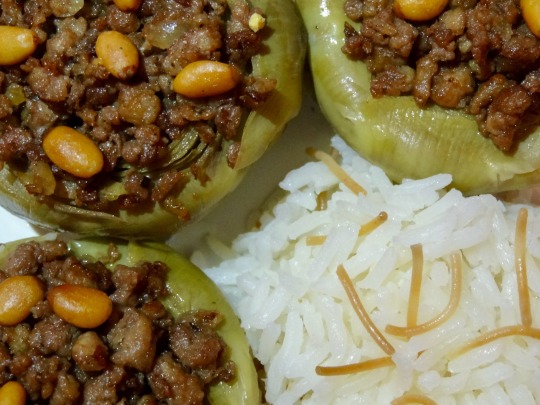
Tip: The white flesh at the base of the bracts (or "leaves") that you removed from the artichokes for this recipe is also edible. Try simmering removed leaves in water, salt, and a squeeze of lemon for 15 minutes, then scraping the bract between your teeth to eat the flesh.
182 notes
·
View notes
Note
hello, i know you get a lot of Weird Mean Asks so i thought you might appreciate a funny passover story in your inbox. in preparation for the first passover seder that i ever hosted, i went to party city and got a bunch of tiny plastic frogs. before the seder, i gathered all the kids and gave them little handfuls of frogs and said "when i'm telling the story of the plagues and i get to the part about frogs, throw these at the adults. they have no idea." i then gathered the adults and gave them frogs and said "when im telling the story of the plagues and i get to the part about frogs, throw these at the kids. they have no idea." the seder began, it was very normal and nice, and then i started telling the story about the exodus... and then i got to the frogs... and suddenly there was a CHAOTIC RAIN OF FROGS FROM ALL SIDES OF THE TABLE, FROGS EVERYWHERE, FROGS PELTING YOU FROM ALL DIRECTIONS. everyone realized what happened and burst into laughter
I LOVE THIS SO MUCH
964 notes
·
View notes
Text
the real "jewish christmas" is passover bc people are preparing for it a major holiday early
82 notes
·
View notes
Text
Happy New Year, Jake
Happy Rosh Hashanah to the Moon Knight system

I haven't written enough for Jake, so he gets an impromptu story this lovely Rosh Hashanah (New Year).
Pairing: Jake Lockley x gn!reader
Word Count: 820
Content: Fluff, slight feelings of unworthiness, mentions of food, alters mentioned, brief reference to past trauma, mentions of religion and religious practices, not beta'd
☾ ⋆*・゚:⋆*・゚☾ ⋆*・゚:⋆*・゚☾ ⋆*・゚:⋆*・゚
You asked Marc and Steven if you could do this.
Celebrate something with Jake.
Marc had some happy memories of holidays - Passover meals - finding the afikomen and getting a few dollars for it. The food, the wine, the prayers, the traditions.
Hanukkah wasn't quite as big of a holiday, but there were presents and dreidel to play and latkes to eat.
There were candles to light and services to attend.
Then, one day, there was no more happiness.
Steven's memories were spotty at best, but they were happy. His heart was rooted in the traditions of those before him.
But Jake had none of this. He was a shadow - a creature of the night. He had only been in your life for less than a year.
Jake was a difficult man to get to know. He preferred to keep to himself, but he was soft for you - that, he could not fight.
You didn't want to ambush him, or even surprise him. You asked his permission.
"Could...do you think we could have a little dinner for New Year's?" You asked him one night, moonlight spilling across the bed as you drew circles on his bare chest with your fingertips.
"New Year's?" He gruffed out, confused. "In September?"
"Rosh Hashanah," you supplied. "You know...the new year. If you want. I wanted to make you dinner - just something nice."
Jake's calloused hands scratched lightly down the curve of your back. "Not sure, mi vida. Better ask - "
"I did," you interrupted. "Marc's not ready yet and Steven is okay skipping this year - at least the dinner so you and I can share it. Only if that's okay with you. It doesn't have to be anything you're uncomfortable with."
The stubble of his chin tickled the skin of your cheek as he whispered back and forth with you.
"Okay. Yeah. I...I don't know exactly what I'm supposed to do, but...sure."
You were excited, having hoped Jake wouldn't turn you down.
You prepared a savory meal - doing most of the work the night before. You set an elegant yet simple table, with your best dishes, a tablecloth and your grandmother's silver.
A round challah loaf sat on her silver serving platter. You prepared apples and honey to symbolize the hope for a sweet year. You also served pomegranates and some vegetables. You made some brisket for Marc to eat later. Wine glasses and water glasses were set appropriately. You were ready.
You put the finishing touches on the table just as Jake emerged from your bedroom, straightening his tie. Jake was no stranger to wearing a tie or looking absolutely dashing at any given moment.
But this was something else. Instead of his typical leather jacket, he wore a dark suit jacket. Noticing your blatant stare, he ran a hand over the stubble of his jaw.
"I think this is like a...proper dinner," he attempted, sounding a little like Steven. "This too much?"
"Jake," you breathed, floating toward him. "You look incredible." Placing your hands on his muscled chest, you leaned in and brushed your lips tenderly over his.
"Shana Tovah," you wished him, motioning for him to have a seat at the table. But he pulled you back to his side, pressing a sweet kiss to your temple.
As you sat down to enjoy your holiday meal, your heart burned within your chest each time Jake seemed uncertain about what exactly to do. The last thing you wanted was make him uncomfortable, or make him somehow feel less...Jewish? Than Steven or Marc.
You only desired for him to be who he was. But you wanted him to feel a part of his history too, if he was comfortable.
"You okay?" You quietly asked, watching as he dipped his apple slice into the honey.
He paused, his warm brown eyes going wide. "Did I do something wrong? Is there like a prayer?"
"Jake, you can't do anything wrong. This is for you. Just...be with me." You reached across the table and squeezed his hand, watching as his shoulders relaxed.
"This is nice, baby," he spoke up after a few minutes. Leaning in, he made sure to catch your eye. "It's really nice. Thank you...for thinking of me."
You smiled warmly. "Of course, I'm always thinking of you."
You shared your special meal and some traditions together, feeling so warm inside and so grateful for this man of yours. When you got up from the table, he pulled you close and told you how amazing you looked.
"Gotta dress up like this again so I can take you out," he roughly whispered against your ear while holding you against him.
Easing back, you brushed your fingers along his jaw. "You mean 'take me out' a date, right? And not...your nighttime job?" You teased.
"Very funny," he mocked, scooping you up into a hug, where you stayed for a while, content in his arms.
"Happy new year, baby," he whispered, feeling like he belonged.
☾ ⋆*・゚:⋆*・゚☾ ⋆*・゚:⋆*・゚☾ ⋆*・゚:⋆*・゚
Moon Knight Masterlist
Main Masterlist
#moon knight#jake lockley#jake lockley x reader#holiday fic#rosh hashanah#new year#happy new year#steven grant#marc spector#moon knight system#moon knight fic#jewish holidays#oscar isaac characters
251 notes
·
View notes
Text
Am I the only one here who really likes Matzah. I see all these posts about how bad it is and it was a surprise for me lol.
I really like its taste, it reminds me of my childhood when the local Jewish charity organization was helping our family by sending us boxes of food (my great-grandfather was Jewish, so my grandma has a right to receive this help, and our family was quite poor back then), and there always was some Matzah.
This year on Passover our local Orthodox Jewish community gave some Matzah to their friend, my mom’s coworker’s daughter, she gave it to her mom, who gave it to her coworkers, including my mom, who gave it to me. I was so happy. My mom knows I’m preparing to convert, so she was like “guess what I have!”. We both were so happy and I almost cried 😭
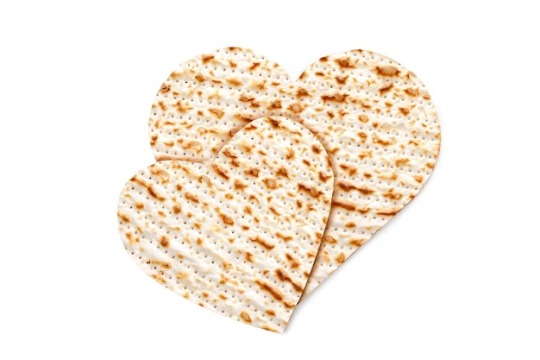
77 notes
·
View notes
Text
PRESS BRIEFING BY IDF SPOKESPERSON, REAR ADMIRAL DANIEL HAGARI
"Good evening. Tomorrow we will gather with our loved ones and celebrate the Passover Seder. A moment before the holiday that marks freedom, it is impossible not to think about those whose freedom was taken from them in an immensely cruel way. Passover will mark 200 days of the very real and painful absence of the hostages. Our moral obligation to return the 133 hostages and release them to freedom takes on an additional meaning today. If the hostages hear us, I turn to you now - we will fight until you return home to us. Dear families of the hostages, we know that these are unbearable days for you and we promise that we will do everything, everything to return your loved ones.
IDF forces are deployed along the entire length of the borders of the State of Israel to ensure the safety of the citizens of the State of Israel. Even during the holiday, we must continue to be vigilant and adhere the Home Front Command instructions. The instructions remain unchanged. If there are any changes, we will inform you immediately, responsibly and transparently. At the front of our minds, is the security of our citizens.
This week, In Gaza, we completed another operation in the central Gaza Strip against Hamas to destroy terrorist infrastructure and terrorists in order to prevent Hamas from restoring its capabilities. All the while there are forces operating inside Gaza alongside additional forces preparing for the next moves in the war. Today, the Chief of the General Staff was at the Southern Command and approved the next moves in the war.
This week, on the northern border, we struck targets of the Hezbollah terrorist organization, including aerial defense array infrastructure deep inside Lebanon. We are aware of the great difficulty endured by the residents of the north who have been away from their homes for such a long time. We are determined to continue to target Hezbollah, to push it to the north and to create a security reality that will allow the residents of the north to return to their homes safely.
In Judea and Samaria, IDF, ISA and Israel Border Police soldiers completed a counter-terrorism operation in the Tulkarm area in which we eliminated terrorists, apprehended suspects, destroyed explosive production laboratories, and confiscated many weapons. IDF forces continue to operate in Judea and Samaria around the clock to counter terrorism and protect the roads. We are strengthening the defense before and during the holiday.
Many regular and reserve IDF soldiers will celebrate the holiday when they are far from home, but they will celebrate the Seder together. I would like to thank and express such great appreciation to all the families of the reserve and career personnel, for the support which they receive at home, this support is very important to us. In the last few days, we have completed the preparations for the holiday and all the soldiers in the field will be served a warm and proper holiday meal.
We do not forget those who are not with us tonight after they fought and fell on the battlefield. Dear bereaved families, on the eve of the holiday like every other day of the year, the pain is too much to bear, your loved one who sacrificed the most precious of all did it so that we could live here, we do not forget and will not forget, we are together with you."

UPDATE: HOME FRONT COMMAND GUIDELINES
Due to the security situation, the Home Front Command determined the following guidelines as of Sunday, April 21 2024 at 18:00, until Thursday, April 25, 2024 at 18:00
*The Home Front Command English site has made an error in their text for the rest of country that is in the Green Zone.
Correction:
Towns classified as green – Full Activity – The rest of the country
Educational Activities - Educational activities can be held without restrictions.
Gatherings and Services - Gatherings can be held without restrictions
Workplaces - Operating without restrictions.
56 notes
·
View notes
Text
It's useless ... really ...
Why bother re-posting news items that just get more depressing every time ...
We all know that inflation, illegals, government crimes, radical Islam and propaganda are destroying the world that we've known for all of our lives ...
No sense worrying about the train wreck headed our way so all we should be doing is praying, preparing and talking to our families about it ...
... before it gets here ...
Spend this week with those whom you love and make sure that you're ready to meet whatever comes your way how ever you can ...
I'm looking forward to Pesach (Passover) this year because I want to see it's 2024 version and the miracles of GOD's love that go along with it ...
SHALOM !
64 notes
·
View notes
Text
Shava Tova
Moon Boys x non-jewish!reader
Join my taglist!
Masterlist
Moon Knight master list
Summary: You go to Rosh Hashanah services in Chicago with your boys, and are happy to learn more about this part of themselves.
Warnings: Illusions to Marc's childhood, Judaism references I try to explain. Reader isn't Jewish and I'm aware my readers are from different religious backgrounds but I think in a majority (from what I know?) it's okay to attend services and participate in things like the tashlich. I try to keep it vague though, but only you really know what you are comfortable with so use discression!
A/N: I am not Jewish, I am a hopeful convert! This year was my first Rosh Hashanah and I was very moved by it all. I'm lucky enough to have gotten to know a friend there and her and her family are very welcoming and have been wonderful explaining this holiday and others and preparing me for Yom Kippur. That being said, I attend a reform temple. I do not know what denomination Marc is, but my evidence seems to point to conservative. Also, I know traditions are different country to country and group to group (Ashkenazi, Sephardi etc) all have different practices. I tried to stick to what I found the most universal in my studying but I am always ready and willing to be corrected. If there is something incorrect, please let me know!
****************
You always thought he looked so handsome like this, with his prayer shawl and kippah on… it didn’t hurt that he was dressed up for the holiday in a black suit. His Kippah and tallit were white, the traditional color for Rash Hashanah, and your dress matched him.
You’d gone to a few holidays with him, and tried to come to shabbat whenever you could, but today was special. Rosh Hashanah was an important holiday and the first time you were going with Steven, and the first time you were going to a service of any kind where his father was the rabbi.
You had met Steven last year in January and were thrilled when Elias invited you both to come to Chicago for the High Holy days, Rosh Hashanah, which was the start of the new year in the Hebrew Calendar, and Yom Kippur was next week and a day of atonement. Rosh Hashanah was a favorite of Steven’s so he would be fronting during services, although Marc would come to the front when people came to talk to him; people he had known in childhood. It was going to be a little difficult for Marc, but he’s said he’s made a lot of progress in recent years regarding his family, and you were so proud of him.
Marc would be fronting for Yom Kippur, a holiday based around atonement for sins. Steven was the one who usually fronted during shabbat, he was the most insistent on staying observant, but Marc and Jake had their days too. Jake liked Purim, and Passover and Hanukkah had multiple days making it easy for them all to get time, Elias knew of all the boys, and although Jake was more guarded for Marc’s sake, Steven was thrilled to help Marc rebuild his relationship as he and Elias got to know each other.
You’d met Elias earlier this week, but were determined to make a good impression at services, following along as best you could and participating where was appropriate as a non-Jew; you were just so thankful they boys were sharing this part with you, and between meeting their dad, Marc showing you around his hometown and celebrating the High Holy Days with them, you felt like a part of their family.
Still, you were nervous. “Do I look okay?” You ask Steven as he adjusted his tie in the mirror.
When he turned to you, his face lit up so bright you couldn’t help but smile with him. “Oh, love!” Steven walked over to where you stood. “You look absolutely ravishing.” He wrapped you up in your arms and kissed your hair so he didn’t mess up your makeup, but his lips trailed down to your neck.
“Steven!” You giggle. “I’m not trying to look sexy, I want to make a good impression! Is this dress not appropriate?”
Marc fronted. “It’s beautiful, baby, so are you. Although you’re gonna wanna wear sandals.”
*
You tried your best to follow along. You didn’t know a lick of Hebrew except a handful of words you’d picked up during shabbat and from what Steven explained to you, but you were trying.
The music was beautiful and kept you engaged, and it was fun to see everyone tapping their feet, even if you weren’t sure when you were supposed to; you followed Steven’s lead for that. Elias has greeted you warmly when he saw you and Steven, and although you didn’t get the chance to talk much (as a rabbi, he had many people to welcome), Steven promised there would be time at home.
During one part, Elias welcomed everyone to wrap their tallit around their neighbor, and when Steven wrapped you up in his tallit you really did feel like a part of his family, a part of him. You and him stayed wrapped up like that even after that prayer was done.
“Steven?”
“Yes, love?”
“Thank you for sharing this with me. It’s beautiful.”
*
After the service, the congregation walked a few blocks down to Lake Michigan for the Tashlich, getting into the sand beach. This is why Marc suggested sandals.
Steven handed you bread. “We’ll say a prayer, and then you think of your sins during the year and tear off a piece of the bread into the water for each sin.”
Jake fronted. “Although considering last night, we might need more than one slice.”
“Jake!” You whispered, gently smacking his arm before taking off your sandles, as Steven took off his socks and shoes. Most didn’t get in the water, but you wanted to wade, to feel the cool lake water on your toes. “We need to come back next summer so we can swim.”
Steven kissed you. “I’d love that. I love everything we do together.”
You then turn to focus on the task at hand, casting the sinful bread into the water to be washed away. You swore Marc had fronted during this cleansing, only confirmed to you by the way he reach out for you when you stumbled leaving the water.
*
Back at the synagogue, there was bread, honey and apples, Steven explaining it was meant to ring in a ‘sweet’ new year. It was delicious, and clearly the people put a lot of care into planning it.
“This apple bread is BUSSIN” You practically moan as you devour it.
Elias’s voice behind you. “Thank you, I made that one, actually”
You gasp, turning around and covering your mouth in embarrassment. “Oh my go- uh, gosh. Shoot, sorry.”
Jake is laughing at your fumbling, but Elias powers through like nothing happened. “It’s alright, did you enjoy the service?”
“Yes! I really loved the… uuhh… Marc, baby, what was that part I liked?”
Marc’s hand was firmly clasped with yours; his stability when he was anxious. “The shofar”
“Yeah, the shofar!”
Elias nodded. “Marc ever tell you he was the ba’al tokeah one year?”
Marc leaned in to clarify that was what the person who blew the shofar was called.
You lit up at that, Marc didn’t play instruments so this was new information. “No he didn’t!”
“And he played Hamen in his Hebrew school play for Purim, have you ever been to Purim?”
Shaking you head, you squeeze Marc’s hand three times in reassurance, and he squeezes it three times right back. You knew any mention of his childhood was contentious, but he had mentioned no wanting to tiptoe around it anymore. “I didn’t go last year, we had just begun dating back then.”
“You’ll have to go some time, it’s definitely a fun one.”
“You gonna take me next year?” You smile at your boyfriend.
He smiled right back. “I think that can be arranged.”
Elias excused himself, needing to see a few more people before the family service that afternoon, promising you had his attention that evening.
Steven stayed firmly by your side. “Are you having a good time? It’s not too much?”
You lean into him, happily munching on some honey covered apples. “I’m having a wonderful time.” Looking at him again, you place a hand softly on his cheek and smile when he keens into you. “I wanna know all the things that make you, you, and this is something obviously important. Thank you for inviting me.”
Steven bought you in for a soft, modest kiss, his lips tasting like honey and you were sure yours were the same. “Thank you for coming with me, and thank you for taking us as we are. All the good and bad.”
"Shana tova, Steven."
"Shana tova."
***************
SHANA TOVA TO MY JEWISH READERS! I know I'm late but after services I took like a 2 hour nap lolololol.
Also, I have another Rosh Hashanah fic! this was posted last year... can you believe ive been writing over a year?!?!?!
Love ya'll. Gotta admit I'm a little nervous bc posting Jewish content always makes the wierdos come out in my asks lol.
@fandxmslxt69 @k-ra @ivystoryweaver @whatthefishh @campingwiththecharmings @littlenosoul @missdictatorme @steven-grants-world @ahookedheroespureheart @runa-falls @mikaelak @stevenandmarcslove @pikapuff-316 @@myfandomlikesandstories
#steven grant x reader#marc spector x reader#jake lockley x reader#moon knight x reader#moon boys x reader#moon knight fanfic#moon knight#moon boys#fanfiction#jake lockley#moon knight fluff#moon knight fanfiction#steven grant#marc spector#jewish marc spector
172 notes
·
View notes